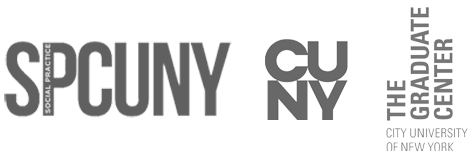ARTS 778 (Queens College) / ARTS 731 (Queens College) / IDS 81630 (Graduate Center)
Wednesdays, 6:30–9:50 PM
This graduate seminar brings together diverse practitioners and researchers working at the intersection of art, architecture, urban planning, publics, and social justice to examine real world projects in which they are currently engaged, what work means across disciplines, and how we develop, manage, and change our ways of working. Focused on action, communication, and responses to on-hand, practical concerns, the course serves as a clinic on interdisciplinary collaboration based on direct experience. Students will be divided into project working groups to support each others’ practices in an ongoing way, bringing their varied educational, work, and cultural backgrounds to the table as a way to workshop strategies, test solutions, and deepen the community engagement of each group member’s project. Where appropriate or relevant to a project site or topic, students are also invited to collaborate. With an emphasis on group reliance, mutual aid, and resource mapping, this course attempts to move away from harmful models of labor, and towards both practical outcomes throughout the semester, and replicable, productive practices and frameworks for future work.
As background/prerequisite to the course, each student must bring to the table a project in which they’re already engaged; relevant projects can exist across creative sectors, including visual arts, architecture and urban planning, theater and performance, literary arts, and socially engaged art. The course will involve visits to students’ project sites (as is possible within the confines of the ongoing COVID-19 pandemic).





